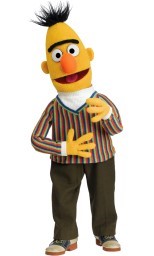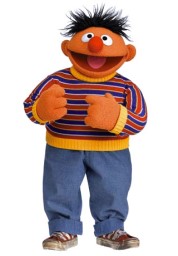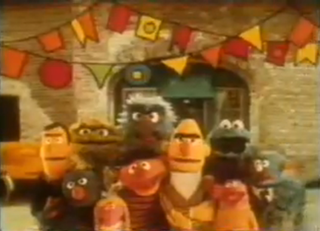
Oscar the Grouch is a Muppet character created by Jim Henson and Jon Stone for the PBS/HBO children's television program Sesame Street. He has a green body, no visible nose, and lives in a trash can. Oscar's favorite thing is trash, as evidenced by the song "I Love Trash", with a running theme being his collection of seemingly useless items. Although the term "Grouch" aptly describes Oscar's misanthropic interaction with the other characters, it also refers to his species. The character was originally performed by Caroll Spinney from the show's first episode until Spinney's retirement in 2018. Eric Jacobson began understudying for the character in 2015, and officially took on the full role after Spinney's retirement in 2018.

Bert is a golden yellow Muppet character on the PBS/HBO children's television show Sesame Street. Bert was originally performed by Frank Oz.

Ernie is an orange Muppet character created and originally performed by Jim Henson for the children's television show Sesame Street. He and his roommate Bert form the comic duo Bert and Ernie, one of the program's centerpieces, with Ernie acting the role of the naïve troublemaker, and Bert the world-weary foil.

Count von Count is a Muppet character on the PBS/HBO children's television show Sesame Street. He is meant to parody Bela Lugosi's vampiric character, Count Dracula. His first appearance on the show was on the 4th season in 1972, where he counts blocks in a sketch with Bert and Ernie.

Sesamstraat is a Dutch television series in the Netherlands, and a localized version of the U.S. children's program Sesame Street. In its early days, the show was broadcast in Flanders (Belgium) as well. It is the second longest-running foreign adaptation of Sesame Street without interruptions, behind only Sesamstraße. It targets children between 3–7 years old.

Sesamstraße is a German children's television series that airs primarily in Germany and the surrounding German-speaking countries. It is a spin-off of the first preschool programme Sesame Street. The show has been running on Norddeutscher Rundfunk (NDR) since 1973, premiering on 8 January in that year. Sesamstraße is also shown on the children's channel, KiKa. It is made for children between the ages of three and seven.

Ulitsa Sezam is the Russian production of the children's television program Sesame Street. The show was first released in 1996 and went off the air in 2010.
Vila Sésamo is a Brazilian co-production of the first preschool television programme Sesame Street. As of 2009 it airs on TV Rá-Tim-Bum. As of 2016, similar to Plaza Sésamo, new seasons air under the title Sésamo. The series debuted on October 12, 1972, moving from TV Cultura to SKY Play on June 25, 2020.

Play with Me Sesame is an American children's television series, created by Sesame Workshop and Nickelodeon for their former joint venture Noggin. It is a spin-off of Sesame Street hosted by Ernie, Bert, Prairie Dawn, and Grover. The series' backgrounds and animated elements were made by Nickelodeon Digital in New York City. Nickelodeon and Sesame Workshop developed the show to expand on Sesame Street by directly encouraging young viewers to interact with the characters. To do this, they combined classic Sesame Street sketches with new segments, where the hosts invite preschoolers to join them in games.
Sesame Street... 20 Years & Still Counting is a 1989 television special celebrating the 20th Anniversary of Sesame Street. Hosted by Bill Cosby, the special aired on Friday, April 7, 1989, on NBC.
Baghch-e-Simsim is a Dari- and Pashto-language co-production based on the American children's television series Sesame Street. The series launched in Afghanistan in December 2011, and has aired on TOLO and Lemar.
Susam Sokağı is the Turkish co-production of American children's television program Sesame Street. It aired on weekday mornings at 9 am on TRT, the state television in Turkey, in the late 1980s and early 1990s.
Sesame Street international co-productions are adaptations of the American educational children's television series Sesame Street but tailored to the countries in which they are produced. Shortly after the debut of Sesame Street in the United States in 1969, television producers, teachers, and officials of several countries approached the show's producers and the executives of the Children's Television Workshop (CTW), renamed Sesame Workshop (SW) in 2000, about the possibility of airing international versions of Sesame Street. Creator Joan Ganz Cooney hired former CBS executive Michael Dann to field offers to produce versions of the show in other countries.
A wide variety of characters have appeared on the American children's television series Sesame Street. Many of the characters are Muppets, which are puppets made in Jim Henson's distinctive puppet-creation style. Most of the non-Muppet characters are human characters, but there are many characters that are animated.
Sesame Square is the Nigerian version of Sesame Street. It launched in 2011 as West Africa's first Sesame Street adaptation. Nigerians produce and voice the series in Standard English. It airs on the Nigerian Television Authority network.

SimSim Humara, also known as Sim Sim Hamara; meaning Our Sim Sim) is the Pakistani version of the children's television series Sesame Street. It is produced by Pakistan Children's Television and Rafi Peer Theatre.

Bert and Ernie are two Muppet characters who appear together in numerous skits on the PBS/HBO children's television show, Sesame Street. Originated by Frank Oz and Jim Henson, the characters are currently performed by puppeteers Eric Jacobson and Peter Linz; Oz performed Bert until 1 January 2006.

Kus Bani Koshur Karorpaet is an Indian Kashmiri-language television game show based on Kaun Banega Crorepati. It premiered on 29 April 2019. It had its finale episode aired on 6 July 2019. It is hosted by Rayees Mohiuddin. The show is broadcast on Doordarshan Kashir. On 3 July 2019, muppets Chamki and Grover from the Indian adaptation of Sesame Street, Galli Galli Sim Sim which airs on national sister channel Doordarshan National, made a crossover appearance in the 56th episode of the show by speaking in Hinglish.











